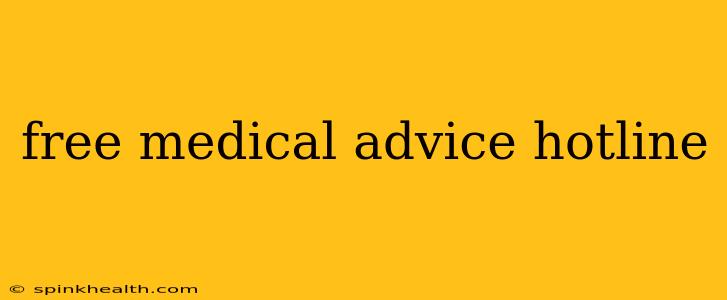Navigating the healthcare system can be confusing and stressful, especially when facing an unexpected health issue. Knowing where to turn for reliable and free medical advice can be the difference between quick resolution and prolonged worry. This guide explores the landscape of free medical advice hotlines, addressing common questions and concerns. We'll explore the limitations, benefits, and what to expect when seeking assistance.
What are Free Medical Advice Hotlines?
Free medical advice hotlines offer a way to connect with healthcare professionals for non-emergency medical concerns. These services often provide basic medical guidance, triage support, and information on health resources. Imagine you woke up with a persistent cough; a free hotline might be your first step towards understanding the issue and deciding on the next course of action. Think of them as a first point of contact, a helpful guide before rushing to the ER or doctor's office.
Are Free Medical Advice Hotlines Always Free?
While many hotlines advertise "free" services, it's important to understand what that entails. "Free" generally refers to the initial consultation and advice. However, depending on the hotline and the situation, you might be directed to a paid service for further diagnostic tests, specialist consultations, or specific treatments. Therefore, always inquire about potential costs upfront to avoid any surprises.
What Kind of Medical Advice Can I Get from a Hotline?
The type of advice you can receive varies depending on the specific hotline and the qualifications of the personnel answering your call. Generally, you can expect:
- Basic medical information: Information on symptoms, common illnesses, and self-care practices.
- Triage support: Help in assessing the urgency of your situation and guidance on whether to seek immediate medical attention or wait for a scheduled appointment.
- Referrals to resources: Connections to local clinics, hospitals, and other relevant healthcare services.
What if I Need Immediate Medical Attention?
Crucially, free medical advice hotlines are not a replacement for emergency medical services. If you are experiencing a life-threatening emergency, such as chest pain, severe bleeding, or difficulty breathing, call your local emergency number (911 in the US) immediately. These hotlines are designed for non-emergency situations, offering guidance and support for less urgent health concerns.
What are the Limitations of Free Medical Advice Hotlines?
While free medical advice hotlines offer valuable assistance, they have limitations:
- Limited scope of practice: Hotline professionals cannot provide diagnoses or prescribe medication. Their role is to provide guidance and direct you to appropriate resources.
- Lack of physical examination: They cannot conduct physical examinations, limiting their ability to make accurate assessments.
- Potential for delays: Waiting times can vary depending on the hotline's volume and staffing.
How Can I Find a Reputable Free Medical Advice Hotline?
Finding a trustworthy hotline requires research. Look for hotlines affiliated with reputable organizations such as hospitals, universities, or established healthcare networks. Check online reviews and look for details about the qualifications of the medical professionals providing advice.
What Questions Should I Be Prepared to Answer?
When calling a free medical advice hotline, be prepared to provide relevant information such as:
- Your symptoms
- The duration of your symptoms
- Any relevant medical history
- Any medications you are currently taking
Providing accurate and complete information ensures the hotline professional can offer the best possible guidance.
This guide offers a starting point for understanding free medical advice hotlines. Remember, proactive health management is key, and these hotlines can be valuable tools in navigating your healthcare journey. However, always prioritize seeking professional medical attention when necessary.

